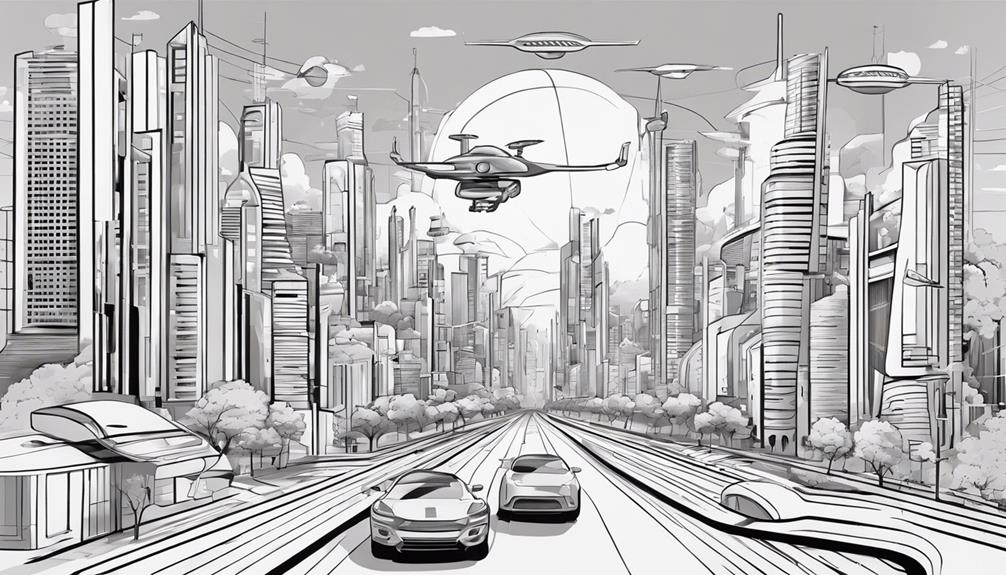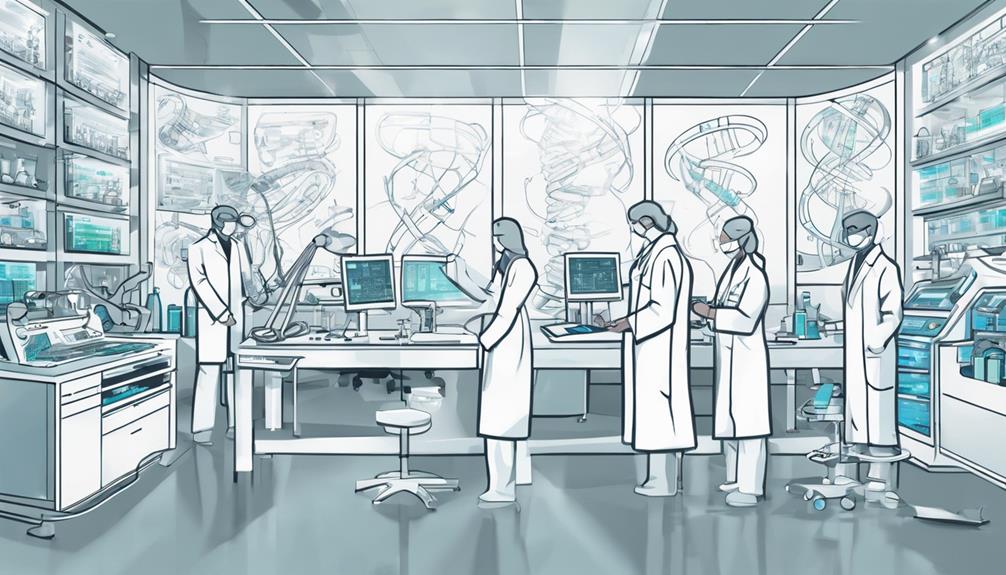The horizon of humanity's future beckons with a blend of unparalleled promise and formidable hurdles. Sailing amidst the winds of technological transformation, mankind stands at a critical juncture, poised between the realms of groundbreaking innovation and existential risk. As the tides of progress surge forward, propelled by the currents of artificial intelligence and genetic engineering, the vast unknowns of space colonization and ecological equilibrium loom large on the horizon. The path ahead is laden with choices that will shape the destiny of our species, raising profound questions that demand contemplation and collective action.
Key Takeaways
- Technological advancements will continue to revolutionize society, shaping daily life and pushing boundaries.
- Space exploration holds promise for Mars colonization and collaborative missions, leading to scientific breakthroughs.
- Environmental sustainability is imperative, requiring a shift towards green technology and renewable energy sources.
- Balancing ethical responsibility with genetic engineering's potential for healthcare advancements is crucial for the future of humanity.
Technological Advancements

The exponential growth of technological advancements has revolutionized every aspect of human civilization, propelling us into an era characterized by unprecedented innovation and progress. Science and technology have intertwined to create a landscape where virtual reality and self-driving cars are no longer distant concepts but tangible realities shaping our daily lives.
Technological developments in the realm of self-driving cars have the potential to redefine transportation as we know it. These vehicles, equipped with cutting-edge sensors and artificial intelligence, are paving the way for safer roads and more efficient travel. Imagine a world where accidents are minimized, traffic congestion is reduced, and commuting becomes a seamless experience.
Similarly, the evolution of virtual reality is pushing the boundaries of human experiences. From immersive gaming to virtual tours of far-off lands, this technology is transforming entertainment, education, and even therapy. The ability to transport individuals to alternate realities opens up a world of possibilities for communication, creativity, and exploration. As we continue to embrace these advancements, the fusion of science and technology will undoubtedly shape the future of humanity in ways we have yet to fully comprehend.
Space Exploration
Exploring the vast expanse of space presents humanity with unparalleled opportunities for scientific discovery and technological advancement. As we look towards the future of space exploration, several key aspects come into play:
- Mars colonization: The idea of establishing a human presence on Mars has gained significant traction, with plans indicating potential colonization within the next 50 years.
- Self-sustaining environments: Building habitats that can support human life beyond Earth's confines is a critical challenge that must be addressed for successful long-term space missions.
- Collaboration among nations: Advancing space exploration requires international cooperation, pooling resources, expertise, and technology for ambitious missions.
- Practical applications: Technologies developed for space exploration often find practical use on Earth, benefiting society in areas such as healthcare, communication, and environmental monitoring.
- Scientific discoveries: Delving into space not only expands our understanding of the universe but also paves the way for future advancements in technology and human knowledge.
Environmental Sustainability

Preserving biodiversity and halting species extinction are urgent imperatives for ensuring the long-term sustainability of our planet. Embracing green technology solutions and enhancing conservation efforts are crucial steps towards achieving this goal. As we confront the challenges of the sixth extinction crisis, prioritizing environmental sustainability is paramount for the well-being of humanity and the preservation of Earth's ecosystems.
Green Technology Solutions
Innovative green technology solutions revolutionize environmental sustainability by harnessing renewable energy sources and promoting efficient resource management practices. Green technology solutions are shaping the future of humanity by integrating science and sustainable practices to combat environmental challenges. Key components include:
- Utilization of renewable energy sources such as solar, wind, and hydroelectric power.
- Implementation of energy-efficient buildings and electric vehicles.
- Promotion of recycling initiatives to reduce waste.
- Reduction of carbon emissions to combat climate change.
- Integration of sustainable agriculture practices, water conservation methods, and waste management strategies.
These advancements not only benefit the present but also ensure a greener and more sustainable future for generations to come.
Conservation Efforts
Efforts to safeguard biodiversity and combat habitat loss are critical components of environmental sustainability initiatives, aiming to address the alarming rates of species extinction and preserve the delicate balance of ecosystems. Renowned biologist Edward O. Wilson's proposal for a global reserve covering half the land and sea to halt the sixth extinction underscores the urgency of conservation efforts. Developing robust ecosystem science is essential to preserving biodiversity and tackling environmental challenges effectively. Environmental science must prioritize strategies that protect and conserve biodiversity for the future of humanity. Identifying and characterizing the estimated 10 million remaining species is imperative for enhancing conservation efforts and ensuring the long-term sustainability of our planet's rich biological diversity.
Artificial Intelligence Impact
The evolution of artificial intelligence is reshaping societal landscapes and challenging traditional paradigms with unprecedented vigor. AI, with its advanced capabilities, is transforming industries and daily life, prompting critical ethical considerations to ensure responsible development. This technology holds immense potential to enhance various sectors, particularly healthcare and education, through innovative applications that can revolutionize how we approach these fundamental aspects of human life. However, the increasing automation driven by AI also raises concerns about its impact on the job market, potentially leading to significant shifts in employment opportunities and necessitating proactive measures to address these changes. Establishing robust regulatory frameworks is crucial to govern the rapid advancements in AI technology, ensuring that its applications align with ethical standards and contribute positively to society.
- AI transforming industries and daily life
- Ethical considerations in AI development
- Potential to enhance healthcare and education
- Impact on the job market through automation
- Necessity of regulatory frameworks
Genetic Engineering

Genetic engineering presents a double-edged sword in its potential to revolutionize healthcare through gene editing while also raising significant ethical concerns. The future applications of gene editing hold promise for curing genetic diseases and enhancing human capabilities, but the ethical implications of altering the fundamental building blocks of life must be carefully considered. As we navigate this frontier of science, it is crucial to strike a balance between technological advancement and ethical responsibility to ensure the future well-being and integrity of humanity.
Ethical Implications of Genetic Engineering
Exploring the ethical implications of manipulating the human genome through advanced genetic engineering techniques reveals a complex interplay between scientific progress and moral considerations. The ability to edit the human genome and derive reproductive cells from stem cells raises significant ethical questions that society must address. Some of these include:
- The potential for designer babies and the creation of genetic elites.
- Concerns about eugenics and the perpetuation of societal inequalities.
- The ethical dilemmas surrounding germline editing and its long-term consequences.
- Balancing the benefits of genetic engineering with the risks of unintended consequences.
- The need for robust regulatory frameworks to ensure responsible use of these technologies.
These discussions are crucial as we navigate the implications of human genome editing and stem cell technology on our collective future.
Future Applications of Gene Editing
Ethical considerations surrounding genetic engineering now give way to a compelling exploration of the potential future applications in gene editing technology. CRISPR technology has transformed genetic editing, offering precise DNA modifications. This advancement holds significant promise in treating genetic diseases by rectifying harmful mutations at the genetic level. Stem cell technology further enhances these prospects by enabling the derivation of eggs and sperm from stem cells for potential reproductive applications. As gene editing becomes more accessible, editing embryos to prevent hereditary disorders could become a feasible reality. Additionally, tissue engineering breakthroughs are paving the way for replacing almost every tissue in the body, heralding new horizons in healthcare. The future of humanity may see profound transformations through these innovative genetic technologies.
Social and Cultural Evolution
Undergoing continuous transformation, societal norms, values, and behaviors evolve over time in a dynamic process known as social and cultural evolution. This intricate interplay between social evolution and cultural evolution has shaped human societies throughout history, from early hunter-gatherer communities to the complex civilizations we see today. The advent of communication technology has significantly impacted this evolution, enabling the rapid exchange of ideas, beliefs, and cultural practices on a global scale. As a result, societies have become more interconnected, leading to a blending of diverse traditions and customs.
- Human societies have evolved from hunting and gathering to complex civilizations with intricate social structures and cultural practices.
- Advances in communication technology have facilitated globalization, leading to the exchange of ideas, beliefs, and cultural practices on a global scale.
- Cultural evolution involves the transmission of knowledge, traditions, and customs from one generation to the next, shaping the collective identity of societies.
- Social evolution includes changes in social institutions, governance systems, and societal norms, reflecting the adaptability and resilience of human communities.
Medical Breakthroughs

The advancements in medical breakthroughs, particularly in CRISPR technology and wearable technologies, are revolutionizing the landscape of healthcare with their potential for precise genetic editing and continuous monitoring of health patterns. CRISPR technology allows for targeted alterations in the genetic code, offering hope for treating various genetic diseases. On the other hand, wearable technologies provide real-time data on physiological parameters, enabling individuals to track their health status proactively. Stem cell technology, by its ability to generate eggs and sperm from stem cells, opens up possibilities for fertility treatments and genetic research. Gene editing advancements hold promise for correcting genetic defects in embryos, potentially preventing hereditary diseases. Moreover, tissue engineering is progressing towards developing replacement tissues that could one day revolutionize organ transplantation. The convergence of these technologies is poised to redefine healthcare practices and enhance the quality of life for individuals worldwide.
| Medical Breakthroughs | Applications | Potential Benefits |
|---|---|---|
| CRISPR Technology | Genetic editing for treating genetic diseases | Precision in gene modification |
| Wearable Technologies | Continuous health monitoring | Early detection of health issues |
| Stem Cell Technology | Deriving eggs and sperm from stem cells | Advancements in fertility treatments |
| Gene Editing | Modifying genomes in embryos | Prevention of hereditary diseases |
Economic Shifts
What impact do automation and artificial intelligence have on future economic shifts, potentially altering job landscapes and creating new industries? As we look ahead to the future of humanity, several key factors will shape economic growth and development.
- Automation: The increasing integration of automation and artificial intelligence is expected to revolutionize industries, leading to efficiency gains but also job displacements.
- Income Inequality: While automation may boost economic growth, there is a concern that it could widen income inequality, creating disparities within societies.
- Gig Economy: The rise of the gig economy and freelance work is anticipated to challenge traditional employment structures, influencing how individuals earn income.
- Reskilling Workforce: Transitioning to a digital economy will require significant efforts in reskilling and upskilling the workforce to meet the demands of evolving job markets.
- Sustainability: Emphasizing sustainability and green initiatives will be crucial in shaping future economic models, ensuring practices are environmentally conscious and address pressing ecological concerns.
These dynamics will play a pivotal role in determining the economic landscape of tomorrow, urging societies to adapt and innovate to ensure a sustainable and inclusive future.
Ethical Dilemmas

Automation and artificial intelligence, while driving economic shifts through efficiency gains and job displacements, also give rise to a host of ethical dilemmas that challenge societal norms and values in the digital era. In the realm of privacy, concerns arise regarding the collection and use of personal data in an increasingly connected world. Surveillance practices, often enabled by advanced technologies, raise questions about the balance between security and individual freedoms. Moreover, the issue of data ownership becomes paramount as data has emerged as a valuable commodity in the age of artificial intelligence.
Artificial intelligence introduces ethical considerations such as algorithmic bias, accountability for autonomous systems, and the potential impact on employment opportunities. These dilemmas force us to reevaluate existing ethical frameworks and develop new standards to ensure the responsible and fair deployment of AI technologies. As we navigate these complex ethical landscapes, it becomes imperative to uphold principles of transparency, equity, and respect for individual rights to foster a future where technology serves humanity ethically and responsibly.
Education Revolution
The revolution in education is propelling us towards a future where learning is tailored to individual needs, enhanced by cutting-edge technologies like artificial intelligence and virtual reality. These advancements are not only making education more engaging and interactive but also accessible to a global audience through online platforms and digital tools. As we embrace innovative learning methods and equip students with future-ready skills, the education revolution is shaping the way we prepare individuals for the challenges and opportunities of tomorrow.
Innovative Learning Methods
How can innovative learning methods in education revolutionize traditional teaching approaches to enhance student engagement and knowledge retention? Technology allows for personalized learning experiences through adaptive platforms that cater to individual needs. Virtual reality and augmented reality create immersive educational environments, making learning more interactive and engaging. Additionally, adaptive learning platforms analyze student performance and adjust content accordingly, ensuring optimal learning outcomes. Moreover, gamification of learning, such as incorporating game elements into education, can motivate students and improve their retention of knowledge. By embracing these innovative methods, education can become more effective, engaging, and tailored to each student's unique learning style and pace.
Technology in Education
In the realm of modern education, the integration of technology has catalyzed a revolution in traditional teaching methods, fundamentally reshaping the landscape of learning and knowledge acquisition. The table below highlights key aspects of technology in education:
| Key Aspects of Technology in Education |
|---|
| Interactive Tools |
| Personalized Learning Experiences |
| Adaptive Learning Technologies |
Technology in education revolutionizes learning by providing interactive tools and resources to enhance student engagement, offering personalized learning experiences through online platforms, and employing adaptive learning technologies to cater to individual student needs. These advancements not only make education more accessible and flexible but also improve student outcomes through data-driven insights and personalized feedback.
Future Skills Development
As society progresses into an era dominated by technological advancements and automation, the education revolution prioritizes the cultivation of critical thinking, creativity, collaboration, and adaptability as essential skills for future workforce readiness.
- Emphasis on critical thinking, creativity, collaboration, and adaptability.
- Need for lifelong learning and upskilling due to emerging technologies like AI and automation.
- Essential digital literacy and coding skills for navigating a technology-driven world.
- Increasing value of soft skills such as emotional intelligence and communication alongside technical skills.
- Educational institutions adapting through project-based learning, interdisciplinary studies, and real-world applications to equip students for future challenges.
Global Governance
Effective global governance is imperative for addressing the complex challenges that transcend national boundaries in our interconnected world. Transnational challenges such as climate change, pandemics, and cybersecurity threats require coordinated efforts on a global scale. International organizations like the United Nations, World Bank, and World Trade Organization play a vital role in facilitating global governance by providing platforms for cooperation among nations. Treaties, agreements, and conventions are essential tools for fostering collaboration and resolving disputes in the realm of global governance.
However, the effectiveness of global governance is hindered by issues of sovereignty, power disparities among nations, and conflicting national interests. Overcoming these challenges requires a commitment to strengthening global governance mechanisms and promoting transparency and accountability in decision-making processes. By enhancing global governance, we can work towards achieving peace, security, and sustainability at a global level. It is crucial for nations to recognize the interconnected nature of our world and strive towards greater cooperation and solidarity in addressing shared challenges.
Human-Technology Integration

The fusion of human capabilities with advancing technologies heralds a new era of interconnectedness and transformation. As technology becomes increasingly integrated into human lives, it shapes daily activities and interactions, offering enhanced capabilities and connectivity through innovations like wearable technologies and smart devices. Ethical considerations play a pivotal role in ensuring responsible technology integration and use, emphasizing the importance of mindful development practices.
- Automation and artificial intelligence are revolutionizing industries and job markets, fundamentally altering human-technology interactions.
- Balancing the benefits and risks of technology integration is imperative for sustainable and harmonious coexistence, necessitating thoughtful decision-making and regulatory frameworks.
- The evolving landscape of human-technology integration prompts reflection on the ethical implications of automation and artificial intelligence in various domains.
- Responsible integration of technology requires a proactive approach to address emerging challenges and complexities.
- Striving for ethical technology integration is essential to harness the full potential of advancements while safeguarding human well-being and societal values.
Frequently Asked Questions
What Is the Future of Humans?
Technological advancements in genetic modification hold promise for reshaping the future of humans. Space exploration offers opportunities for expanding our presence beyond Earth, while environmental sustainability remains a critical concern. Integrating these fields could lead to innovations in health, agriculture, and space colonization. Embracing these advancements with ethical considerations is crucial for steering humanity towards a future that balances progress with responsibility.
What Is the Fate of Humanity?
The fate of humanity is intricately linked to various factors, including genetic engineering, artificial intelligence, climate change, and space exploration. These elements collectively shape the trajectory of human civilization. Genetic engineering offers potential advancements in healthcare and agriculture but raises ethical concerns. Artificial intelligence presents opportunities for innovation but also poses risks to employment and security. Climate change threatens ecosystems and human societies. Space exploration offers possibilities for expansion and resource utilization. Balancing these influences will be crucial in determining humanity's future.
How Long Do Humans Have Left on Earth?
The timeline for human existence on Earth is intricately tied to addressing pressing issues like the climate crisis, extinction risks, and inequality. Mitigating these threats is essential for ensuring our survival and extending our time on this planet. Moreover, advancements in technology and sustainable practices play a crucial role in determining how long humanity can thrive on Earth. Exploring solutions through planetary migration and colonization could also impact the future of our species.
What Were the Future of Humanity Thought?
When contemplating future predictions regarding the fate of humanity, one delves into a realm rich with philosophical outlooks, technological advancements, and ethical dilemmas. Speculations on our future evoke discussions on societal evolution, environmental challenges, and the integration of artificial intelligence. The interplay of these factors shapes potential scenarios for humanity, urging us to consider how scientific progress, moral values, and societal structures will navigate the complexities of tomorrow's world.
Conclusion
In conclusion, as humanity navigates the complex landscape of technological advancements, environmental challenges, and ethical dilemmas, it is imperative to remember the adage "knowledge is power." By fostering a deep understanding of the potential impacts of our actions and making informed decisions based on scientific evidence, we can shape a future that is both sustainable and prosperous for all. The integration of human ingenuity with technological innovation holds the key to unlocking the full potential of our shared existence.
